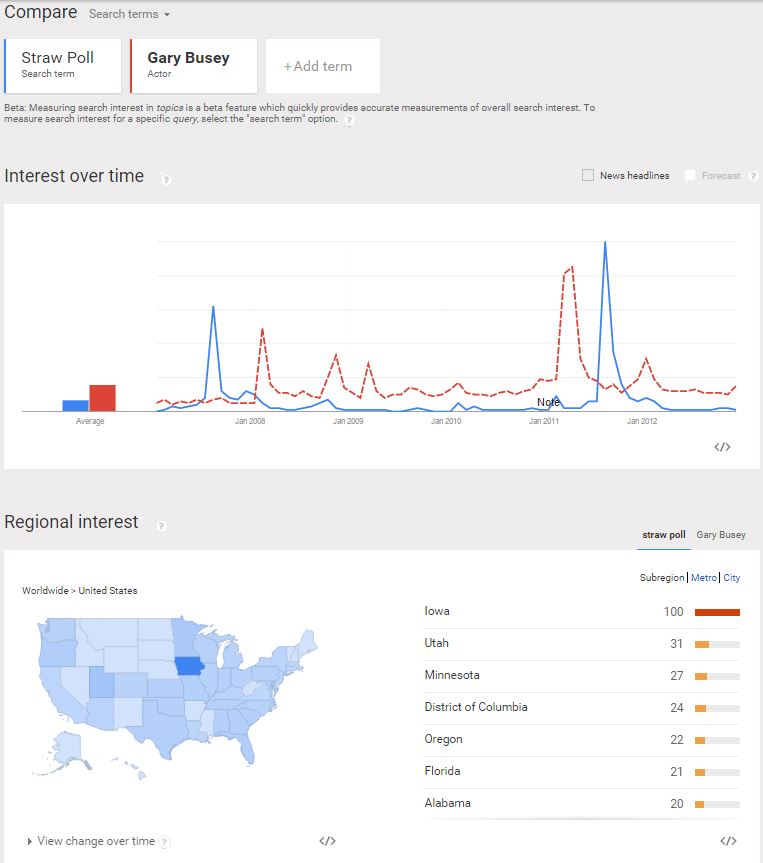The Iowa Straw Poll has been a showcase of GOP politics since 1979, taking place mid-summer before a Presidential election, but only in cycles when no Republican incumbent would be seeking a second term. George H.W. Bush took the first one, followed by Pat Robertson in 1987. Bob Dole and Phil Gramm tied in 1995. George W Bush won in 1999, Mitt Romney in 2007, and Michelle Bachman in 2011.
Until this year, the poll was typically held in conjunction with the Iowa State fair in Ames, just north of Des Moines. Consequently, it was frequently called the Ames Poll. The event was simultaneously a fundraiser for the state party, and an opportunity for prospective candidates to get traction ahead of Iowa’s “first in the nation” caucuses.
The poll didn’t bind any delegates, but could be profoundly influential, promising to raise the profiles of lesser known candidates. It could also provide a harsh test for better known ones. Tim Pawlenty’s stumbling debate performance leading up to the 2011 poll led to a far lower than expected showing. He quit the campaign shortly after, proving the event’s power to winnow the field.
Most Americans aren’t in the habit of following political news very closely. For them the nuances of the Iowa Straw Poll are boring and obscure. But among the politically obsessed, the brand is golden, and prominent enough to make a little blip on Google Trends.
To be sure, those brief flashes of attention pale in comparison to the mindshare captured each and every day by B-list stars, even at their deepest valleys of buzz (Compare, say Gary Busey’s turn on Celebrity Apprentice).
But that’s also a reason the Iowa Straw Poll is so intriguing. Breakthroughs involving discussion of election issues and comparisons of candidates are very hard to come by, especially so early in the political season. Despite its blip of a profile in the overall media landscape, the spike really exists. And thus it stands out.
Consider how unusual it is for Oval Office aspirants to simultaneously: 1) engage in extensive political discussions with non-billionaire members of the public; 2) display generally good manners when talking about each other, and; 3) attract as nearly much attention among couch potatoes as an outrageously over-the-top character in a major prime time reality show. That’s a real achievement in our saturated media environment. Politicians know this, and they respect it. Some fear it.
For a lower tier candidate entering a national race, getting name recognition is a matter of life or death. The Iowa Straw Poll offers an early shot at political glory… a leg up for the long campaign ahead. Political wonks obsess over the event like football fans at a preseason opener. The battle doesn’t count for getting into the playoffs, but it’s meaningful enough for disastrous underperformers to be cut. Another apt sports metaphor is a horse race. The Poll sets up starting gates and dares candidates to prove they’re serious about competing.
Since the official noble purpose of the Poll is to provide an arena for preliminary vetting of candidates, it gives journalists a cue to do their actual jobs of forcing a discussion of the issues. In American politics the fund-raising never stops, but as the event approaches the democratic aspect of Presidential season can’t be avoided. Politicians submit to a series of pre-Poll interviews and televised debates. It’s a good fit for Iowa, whose residents take earnest pride in their “First in the Nation” tradition of scrutinizing the candidates during the long lead up to their winter caucuses. And Iowans clearly understand the virtue of shaking down the field when it’s most populated.
Winning hearts and minds is only one aspect of the show. Logistics matter… maybe most of all. Competitive candidates might pull out all the stops by having out-of-town voters bused in. The price of admission must of course be handled. The process is thus understood to be a test of mastery at turning out loyalists. “Does the candidate have what it takes to win?” is a question that takes increasing priority over “What is this election going to decide?” The pay-to-play model also offered a very practical benefit to the Iowa GOP as a party fund-raising vehicle. That benefit was undercut by the cost of hosting the event in Ames. For 2015, therefore, it’s been moved about 20 minutes west to a less expensive venue in Boone.
For a time, it appeared that the event might be scrapped. It had been accumulating numerous critics inside the Iowa GOP, including the Republican Governor, Terry Branstad. James Strohman, a professor of Political Science at Iowa State University, argued that too many “fringe elements have gained undue influence,” creating problems for mainstream Republicans and undermining prospects for “electable” candidates. But the social conservative and libertarian base voters in the Iowa GOP proved themselves to be a force to be reckoned with. The show will go on.

